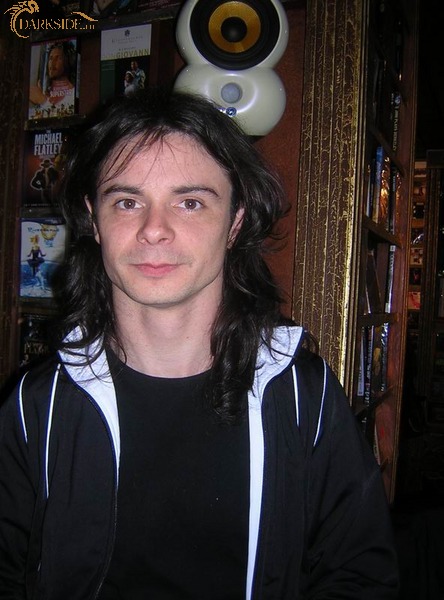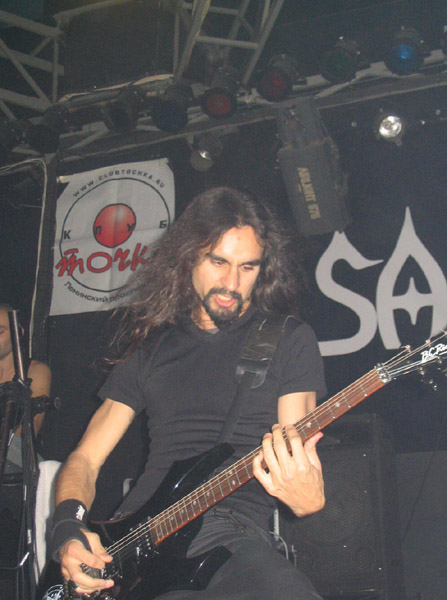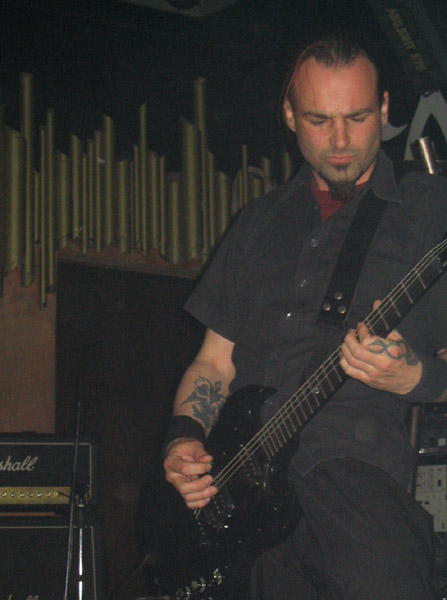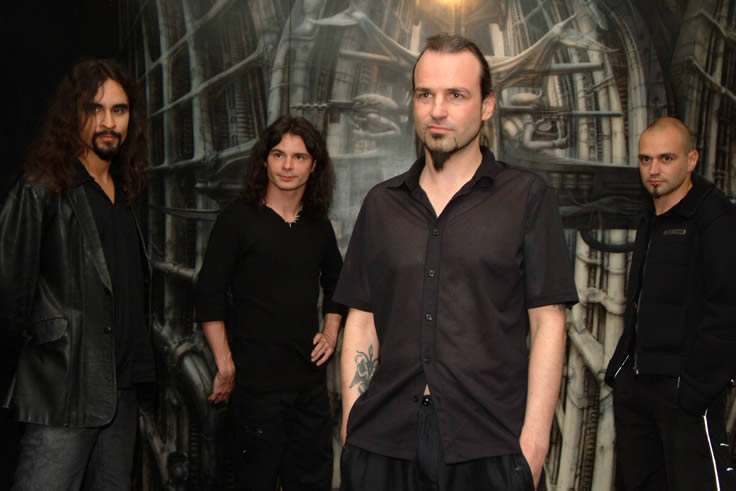
Очень сильно. Изменилось практически все. Я помню, что в первый раз с организацией концерта был полный бардак. Нам предложили сыграть в России, потому что мы выступали в Польше с Napalm Death, изначально мы вообще не планировали ехать к вам, просто подвернулась такая возможность. К сожалению, после этого таких возможностей очень долго не появлялось, но теперь мы снова здесь, и в этот раз все организовано гораздо лучше. Мне очень понравилось, как организаторы нас здесь принимают, особенно по сравнению с первым разом, когда творился полный бардак. Мы тогда проторчали на вокзале 15 или 20 часов в ожидании поезда, но сейчас мы прилетели на самолете, и все стало намного проще.
Когда вам в первый раз предложили выступить в Москве, вы долго сомневались?
Нет, потому что мы готовы были играть где угодно, в любой точке света. Выступить в Польше было уже очень круто, ну а Москва вообще казалась нам несбыточной мечтой, так что мы все равно были очень довольны.
За эти годы музыка Samael очень сильно изменилась. А насколько сильно изменились сами участники группы?
Не менее сильно. Когда ты молод и начинаешь играть музыку, у тебя есть определенное представление о том, чего ты хочешь достичь. Тогда мы хотели записать альбом, который воплотил бы в себе все наши влияния, и, пожалуй, “Ceremony Of Opposites” (1994) стал таким альбомом. Это именно та музыка и те слова, которые я мечтал создать, будучи тинейджером, это очень мрачный, почти торжественный альбом. Но затем у меня появилось желание сделать нечто новое, я стал искать новые влияния, и таким образом мы все начали расти. И до сих пор у нас не угасло желание играть музыку, открывать новые группы и находить для себя новые влияния.
Ваше желание играть музыку до сих пор имеет под собой те же причины, что и в начале 1990-х, или же мотивация музыкантов теперь стала совсем другой?
Сначала мы просто хотели выпустить альбом. Когда ты начинаешь играть, ты первым делом хочешь сочинить пару песен, затем выступить на концерте, затем записать альбом, а затем записать еще один, потому что ты думаешь: «Возможно, наша группа способна на большее». То же самое и с концертами – ты сходишь со сцены и думаешь: «Здорово, нас отлично принимали, но наше выступление, пожалуй, не было самым лучшим в мире». Так что в следующий раз ты стремишься выступить лучше, потом еще лучше, так что наша мотивация – постепенно улучшать все, что мы делаем.
Что бы ты сказал, если бы кто-нибудь в 1990 году дал тебе послушать “Reign Of Light”? Тебе бы понравился этот альбом, или же ты бы его возненавидел?
Вау, я думаю, мне бы он очень понравился. Но мне не кажется, что такой диск был бы возможен в то время, ведь многие влияния, которые на нем проявляются, возникли гораздо позже. В то время мы не слушали группы вроде Prodigy, которые смешивали танцевальную музыку с электроникой, причем очень интересным способом. В 1980-х я вообще практически не слушал музыку того времени, я слушал только Slayer и Metallica, чтобы о
 градить себя от всего, что тогда было популярно, потому что мне ничего из этого не нравилось. Зато в 1990-х на сцене появились новые группы. И именно благодаря им мы сейчас используем столько электроники. Году в 1995-м мы основательно запали на Ministry и Godflesh, которые тоже использовали электронику, но смешивали ее с хардкором и панком, а не с настоящим металлом, как это делаем мы.
градить себя от всего, что тогда было популярно, потому что мне ничего из этого не нравилось. Зато в 1990-х на сцене появились новые группы. И именно благодаря им мы сейчас используем столько электроники. Году в 1995-м мы основательно запали на Ministry и Godflesh, которые тоже использовали электронику, но смешивали ее с хардкором и панком, а не с настоящим металлом, как это делаем мы.Как и когда ты заинтересовался электронной музыкой? Какие группы вызвали у тебя интерес к этой сцене?
Наверное, Godflesh. Их первый диск “Streetcleaner” был просто удивительным. Если ты послушаешь его сегодня, то он покажется тебе очень простым, а порой даже скучным, но на нем были потрясающие идеи, потрясающие чувства, а их звук для того времени был вообще чем-то неслыханным. Мне кажется, именно они были первой электронной группой, которая мне понравилась, не могу вспомнить кого-то еще.
Услышим ли мы когда-нибудь вашу собственную полностью электронную музыку, которую вы несколько лет назад делали в рамках проекта Era One?
Мы не знаем, это же был просто эксперимент. Дело в том, что мы должны были предоставить нашему лейблу какой-нибудь материал, они этого требовали, а мы не чувствовали себя готовыми записывать новый диск Samael, потому что сначала хотели поехать в турне. Так что мы решили попробовать себя в новом амплуа, не принимая во внимание нашу историю, наши корни, необходимость развиваться и все такое. Мы хотели начать все с чистого листа. В 2002 году мы передали лейблу этот материал, но он до сих пор не издан. Причем если его издадут сейчас, я буду чувствовать себя очень дискомфортно. Мы бы хотели еще поработать над этим проектом перед тем, как он увидит свет. Через две недели мы встречаемся с сотрудниками нашего старого лейбла и, возможно, обсудим этот вопрос.
Почему же Century Media так долго не издают этот материал? Ты ведь сказал, что они его от вас требовали…
Дело в том, что они-то требовали от нас обычный альбом Samael. Они говорили нам: «Ну вы ведь можете его записать!». Да, конечно, мы могли его записать, но у нас не было для этого нужных чувств, а чувства для нас очень важны. Мы должны чувствовать, что мы хотим записываться, мы не делаем диски просто потому, что пришло время, или что этого хочет лейбл. И я считаю, что “Reign Of Light” получился именно таким, каким мы хотели. У нас было достаточно времени для работы над альбомом, у нас была нужная мотивация, и я очень доволен результатом.
В мае вы выпускаете второй сингл в поддержку “Reign Of Light”. Означает ли это, что с этим альбомом вы добились коммерческого прорыва?
Мы скорее используем синглы для экспериментов, примерно так же, как мы раньше использовали мини-альбомы. На сингле есть основная песня, взятая с альбома, которой уделяется больше всего внимания – это коммерческая сторона вопроса. Но помимо этой песни, мы помещаем на сингл экспериментальные треки. На новом сингле будет ремикс, который очень отличается от всего, что мы делали раньше, а также кавер-версия Depeche Mode, что для нас тоже очень необычно, ведь за нашу историю мы сделали всего несколько каверов.
На вашем последнем альбоме нетрудно услышать влияние арабской музыки…
Я бы сказал, восточной музыки, это более общее понятие.
То есть, вы слушаете этническую восточную или арабскую музыку?
Немного. Мы все путешествовали по Азии – Мас (басист) ездил в Японию, Кси (клавишник) – на Бали, Макро (гитарист) – во Вьетнам, а я – в Индию. Правда, не одновременно, а в разное время. И мы все очень интересуемся этими странами, потому что для нас это совершенная экзотика, в них так мало общего с тем, к чему мы привыкли. Я помню, как однажды послушал там какую-то кассету – это был скорее голливудский саундтрек, не настолько уж народная музыка, и не все мне понравилось, но на меня произвели большое впечатление некоторые звуки и инструменты – таблы, ситар. И мы пытаемся взять те элементы восточной музыки, которые нам нравятся, и интегрировать их в нашу музыку. Это совсем не значит, что мы двигаемся в направлении чисто этнической восточной музыки.
В целом, что ты думаешь о взаимоотношениях Востока и Запада? Согласен ли ты с тем, что Запад обречен, и что Восток в будущем станет мировым центром цивилизации, или же есть шанс на то, что Восток и Запад могут развиваться параллельно и равноправно?
Кто знает? В наших альбомах нет места политике, но с точки зрения музыки мы как раз и попытались взять все лучшее у обеих культур и смешать «в одном флаконе». Конечно, перемены неизбежны, например, в вашей стране сейчас жить намного лучше, чем раньше. Возможно, это точка зрения иностранца, и местным жителям так не кажется, но я считаю, что все меняется к лучшему, и я надеюсь, что так будет и дальше. В Америке ведь тоже есть свои проблемы. Это только кажется, что там все круто, но, например, там очень велик разрыв между теми, у кого есть деньги, и теми, кто чуть ли не умирает с голоду.
Ты сказал, что в творчестве Samael нет места политике…
По крайней мере, не в прямом смысле этого слова. Конечно, можно все привести к единому знаменателю и сказать: «Все на свете является политикой» или «Все на свете управляется сексом». Тогда, конечно, политику можно найти и в нашем творчестве. Но по крайней мере, я лично не использую этот подход, когда сочиняю песни.
Но зато в вашем творчестве много внимания уделяется философии – ты согласен?
Да, до определенной степени. У нас присутствовал очень сильный религиозный аспект – я был ярым противником религии, потому что меня воспитывали в строгой религиозной обстановке, и я пытался против нее бороться. Но со временем я понял, что борьба с тем, на чем я рос, никуда меня не приведет. Я стал искать другие ориентиры, и так я заинтересовался философией. А затем я попытался создать собственную жизненную философию, и она звучит так: делай все наилучшим образом, всегда выкладывайся на 100 процентов. На первый взгляд, в этом нет ничего особенного, каждый может так говорить, но вы попытайтесь на самом деле так пожить.
Какой из философов тебе ближе всего? Кто из них оказал на тебя наибольшее влияние?
Трудно ответить, я испытывал самые разные влияния. Одно время
 я был большим поклонником Ницше, и когда я читал его работы, они на меня очень сильно повлияли. Но сейчас я уже не уверен, что он – величайший философ в мире, мне кажется, что он слишком бросался в крайности. По крайней мере, такова моя точка зрения. Мне ближе более гибкие доктрины, в которых есть место свободной интерпретации.
я был большим поклонником Ницше, и когда я читал его работы, они на меня очень сильно повлияли. Но сейчас я уже не уверен, что он – величайший философ в мире, мне кажется, что он слишком бросался в крайности. По крайней мере, такова моя точка зрения. Мне ближе более гибкие доктрины, в которых есть место свободной интерпретации. В песне “On Earth” ты упоминаешь множество городов в самых разных частях света. По какому принципу ты подбирал эти города – ты просто хотел, чтобы они хорошо рифмовались, или же каждый из них что-то для тебя значит?
Большинство из них подбирались не просто так. Процентов на 60-70 это те города, в которых мы были лично, и у нас с ними связаны определенные воспоминания – люди, места, хорошо проведенное время. Есть среди них и такие, где я никогда не бывал, например, я пока ни разу не ездил в Китай, но эта страна занимает в моем воображении особое место. Она очень отличается от нашего мира, но ей присуще настоящее величие. Я знаю, что это, наверное, всего лишь фантазм, и на самом деле все иначе, но мне нравится представлять Китай именно так.
На “Reign Of Light” присутствуют два гостевых музыканта – Сами из Kreator и Сандра Шлерет из Dreams Of Sanity. Как получилось, что эти два человека работали с вами?
“Reign Of Light” – наш первый альбом, на котором мы работали с гостевыми музыкантами. Мы познакомились с обоими из них через нашего продюсера Вальдемара Зорихту. До начала записи он приезжал к нам, и мы обсуждали, что мы хотели бы сделать. Мы были совершенно уверены, что хотим попробовать женский вокал в паре песен, плюс в еще одной песне он был теоретически возможен. А идею использовать ситар подкинул нам Вальдемар – он знал Сами, потому что тот участвовал в записи альбома Grip Inc., группы Вальдемара. Мы и раньше использовали в песнях звуки ситара, но синтезировали их с помощью клавишных, точно так же, как ты услышишь сегодня, и получалось неплохо, но настоящий ситар звучит куда лучше. Правда, сначала мы не были в этом так уверены, но решили попробовать, и если не получится, забыть про эту идею. Однако, когда мы получили от Сами записанный трек, мы были так счастливы, что без вопросов использовали его в нашем альбоме.
Значит, гостевые музыканты не работали с вами в одной студии?
Нет, мы ни разу не встречались. Сандра записывалась с Вальдемаром, потому что они были знакомы и раньше, и это была его идея, но Сами сделал все самостоятельно.
Вы уже давно сотрудничаете с Вальдемаром. Насколько велика его роль в создании саунда Samael?
Должно быть, достаточно велика, но это трудно определить точнее. Например, на “Eternal” (1999) мы не работали с Вальдемаром, причем впервые с того момента, как начали сотрудничать с ним. Мы чувствовали себя свободными, никто не вмешивался в творческий процесс, но когда твои идеи не встречают никаких контраргументов, возникает ощущение, что чего-то не хватает. Когда тебе приходится перед кем-то защищать свою точку зрения, ты можешь достигнуть еще лучшего результата, и Вальдемар нам в этом отлично помогает. Фактически, он просто подчищал наш саунд, потому что мы хотели, чтобы
 слишком много партий звучало сразу и вместе, а он в таких случаях говорил: «Здорово, но если у вас в одной песне идей на целых две, то слушатель запутается, так что выкиньте все лишнее, пусть лучше песня будет проще». Мы доверяем ему, потому что уже очень давно знаем друг друга, и хотя сначала мы каждый раз думаем: «Ну, не знаю, давайте попробуем», но сейчас, когда я слушаю старые песни, я не могу представить их звучащими как-либо по-другому. Он всегда оказывается прав.
слишком много партий звучало сразу и вместе, а он в таких случаях говорил: «Здорово, но если у вас в одной песне идей на целых две, то слушатель запутается, так что выкиньте все лишнее, пусть лучше песня будет проще». Мы доверяем ему, потому что уже очень давно знаем друг друга, и хотя сначала мы каждый раз думаем: «Ну, не знаю, давайте попробуем», но сейчас, когда я слушаю старые песни, я не могу представить их звучащими как-либо по-другому. Он всегда оказывается прав.У многих возникает впечатление, что швейцарская металлическая сцена живет своей особой, достаточно замкнутой жизнью – не так много групп из Швейцарии добиваются международного успеха, а если и добиваются, как, например, Celtic Frost, Coroner или Messiah, то достаточно быстро прекращают существование. Насколько трудно играть экстремальную музыку в Швейцарии?
Если ты известен только в Швейцарии, то ты никогда не проживешь с музыки, страна для этого слишком мала. Так что если ты хочешь сделать реальную карьеру, если ты хочешь зарабатывать музыкой на жизнь, если ты хочешь добиться чего-то серьезного, то ты должен работать за границей. Конечно, можно выступать и в Швейцарии, внутренний рынок для нас сейчас благоприятнее, чем когда-либо раньше, потому что у нас контракт с другим лейблом, и мы стараемся вести дела немного по-другому, но нужно работать и в других странах. Швейцария – это не Франция или Германия, где местная группа может продавать альбомы только на внутреннем рынке и прекрасно жить на полученные доходы. У нас такое невозможно.
Вы не планируете когда-нибудь переиздать на компакт-дисках ваши старые демки и EP? Многие фэны хотели бы иметь в коллекции эти записи…
Насколько я знаю, бутлеггеры их уже давно переиздали. Но сами мы никогда на это не пойдем, потому что мне такие переиздания кажутся просто обманом. Те песни были впоследствии перезаписаны для наших студийных альбомов, и, на мой взгляд, новые версии звучат лучше, а если мы переиздадим оригиналы, то это означало бы, что новые версии не очень-то и лучше, и что оригиналы тоже заслуживают внимания. А я так не считаю. Так что мой ответ – ни в коем случае.
Я слышал, что в самом начале вашей карьеры вы отыграли несколько концертов вдвоем – ты и Кси. Как это выглядело?
Мы использовали только гитару и барабаны. Кси играл на ударных, а я подключал стерео-педали и пропускал звук через басовый усилитель без дисторшна. В таком составе мы отыграли всего пару концертов и остались довольны, потому что делали нечто особенное, никто больше так не играл. Но потом мы решили, что надо привлечь в группу кого-то третьего, мы же все-таки братья, и нам не всегда легко вместе. И тогда на басу стал играть Мас.
…И эта троица до сих пор остается ядром Samael, хотя прошло уже больше 10 лет. Как вам удается преодолевать внутренние разногласия и конфликты?
Да у нас всегда какие-то конфликты, но мы достаточно хорошо знаем друг друга и понимаем, как далеко можно зайти. Когда у тебя появляется идея, ты рассказываешь о ней другим, и другие недовольны, нельзя на них слишком сильно давить. Мы научились общаться друг с другом, мы
 знаем, где лежит черта, которую нельзя переходить, и это очень важно. Удивительно, что когда в 2002 году к нам присоединился Макро, он так легко, чуть ли не с первого дня, нашел свое место в группе. Я бы не поверил в такое, если бы не наблюдал все собственными глазами – как может человек присоединиться к группе, участники которой знают друг друга уже более 10 лет, и найти там свое место? Но Макро до Samael переиграл во множестве групп, и у него богатый опыт в общении с людьми, а для группы очень важно не только разделять музыкальные интересы, но и уметь находить общий язык друг с другом.
знаем, где лежит черта, которую нельзя переходить, и это очень важно. Удивительно, что когда в 2002 году к нам присоединился Макро, он так легко, чуть ли не с первого дня, нашел свое место в группе. Я бы не поверил в такое, если бы не наблюдал все собственными глазами – как может человек присоединиться к группе, участники которой знают друг друга уже более 10 лет, и найти там свое место? Но Макро до Samael переиграл во множестве групп, и у него богатый опыт в общении с людьми, а для группы очень важно не только разделять музыкальные интересы, но и уметь находить общий язык друг с другом.На вашем новом сингле будет представлен кавер Depeche Mode “I Feel You”. Почему вы выбрали именно эту песню?
Это идея Макро. Нас пригласили на радио-передачу, но обязательно хотели, чтобы мы исполнили какой-нибудь кавер. Несколько лет назад мы записывали кавер Элиса Купера, и сначала мы хотели сыграть именно его, это было бы очень просто. Но тут Макро предложил сделать кавер Depeche Mode, и мы начали над ним работать. Я доволен тем, что у нас получилось, хотя это и не моя идея.
Будучи давним поклонником Элиса, не могу не спросить, как вам пришла в голову идея записать его песню “I Love The Dead” для мини-альбома “Rebellion” (1995)? Не так много экстремальных групп делают кавера Элиса…
Он очень сильно на меня повлиял, когда я был ребенком. Я помню, как я увидел его по телевизору – он сидел в кресле на крыше автобуса, причем это было задолго до появления фильма «Безумный Макс», и для того времени это было нечто из ряда вон выходящее. Мне очень нравится “I Love The Dead”, в ней столько черного юмора. Но мы хотели сделать ее более серьезной и извращенной.
Значит, на тебя и на Samael в целом оказывали влияние группы 1970-х?
Да, но не в начале нашей карьеры. Когда мы начинали, мы не слушали ничего, кроме дэта и трэша. Я также немного слушал хэви, но старался по возможности дистанцироваться от старых влияний. И тем не менее, такие группы, как Led Zeppelin, определенно на нас повлияли.
А вчера вы видели в Москве еще одну легенду тяжелой музыки, правда, уже 1980-х – Accept. Вам понравился их концерт?
Да, я ведь раньше никогда не видел их «живьем». Мне кажется, все было окей, я ведь знал все песни, тем более что это, по сути, был концертный «бест-оф». Но если честно, я уже много лет не слушаю Accept. На мой взгляд, “Restless & Wild” – просто великолепный альбом, почти идеальный, но после него они стали повторяться. Они нашли удачную формулу и принялись ее эксплуатировать, так что мне это вскоре стало неинтересно.
Не так давно я брал интервью у группы, с которой вы были в турне в 1990-х – у финнов Sentenced, и их вокалист сказал, что группа распадается, потому что музыканты устали от рок-н-ролльного образа жизни. А как вам удается с ним справляться и сохранять свою креативность, тем более что в последние несколько лет у вас было еще и множество проблем в области бизнеса?
Я считаю, что в группе должна быть дисциплина, и она приходит со временем. Например, я никогда не пью перед выходом на сцену, этому надо просто научиться. Конечно, дисциплина в группе не спасет вас от всех проблем, но если кто-то из музыкантов окажется слабохарактерным и начнет творить всякую ерунду, проблем у вас будет гораздо больше. У нас, к счастью, с этим все в порядке.
А есть ли на свете что-нибудь, что могло бы стать причиной распада Samael?
Моя смерть.
Выражаем благодарность Евгению Силину (Alive Concerts) за организацию этого интервью.
Интервью и перевод – Роман Патрашов
Фото – Наталья Хорина, Дмитрий "Ward" Куликов
28 апреля 2005 г.
11 май 2005